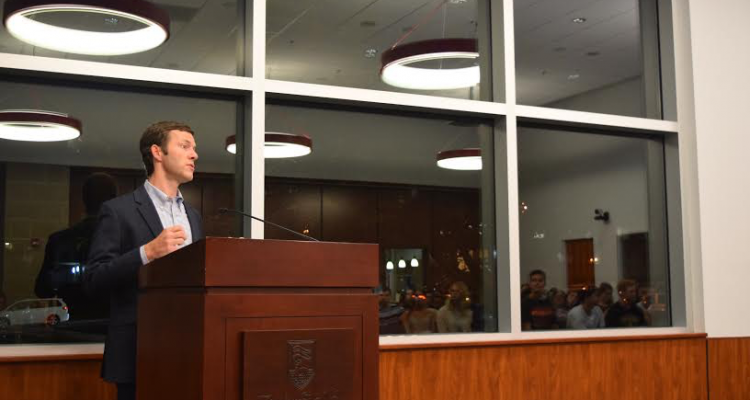The history department hosted Dr. Andrew Kahrl, Ph.D. on Thursday Sept. 13 in the Aloysius P. Kelley Center to talk about his new novel “Free The Beaches: The Story of Ned Coll and the Battle for America’s Most Exclusive Shoreline.” The Kelley Center was filled as Kahrl spoke about the importance of his book and its relevance to not only Fairfield students but to anyone interested in American history and climate change.
Kahrl is an associate professor of history and African American studies at the University of Virginia. His research focuses on not only desegregation in the 60s and 70s but also the environmental and political factors involved in preserving and making our coastlines accessible.
In his opening speech, Karhl said, “This is certainly a history of racial inequality, environmental change and social activism in Connecticut. One that I hope speaks to broader national issues to see how the history of this state can help us to understand the history of America in recent past.”
His book centers around Ned Coll ‘62, a Fairfield alumni who was an activist for desegregating Fairfield beach. Coll was the leader of the Revitalization Corps, an organization that worked toward making beaches in towns all over Connecticut such as Westport, Greenwich and many others accessible to all. African Americans were not allowed access to private beaches such as Fairfield and were not even allowed to buy a home along the shore.
Kahrl said, “Jackie Robinson, the person who could break the color line in baseball, struggled to break the color line in Fairfield County.”
Ned Coll served as an advocate for African American families who were not given a voice. In the hot summers there were accounts of African American children drowning, because they were swimming in unmarked rivers where there was no lifeguard supervision.
Junior Olivia Marcou reflected, “I never really knew how exclusive the beaches are in Connecticut, especially for African Americans before I attended this lecture. I found it very interesting how Ned Coll would just show up with bus loads of African American kids and demand access to the beaches even though he was met with constant backlash from white people in the community.”
Coll and the Revitalization Corps worked to bus children from inner cities to beaches in order to give them access to the ocean.
In asking Kahrl what he wanted the major take away for the students of Fairfield University to be he said, “We are facing the two biggest challenges we face as a country and as a species, the racial crisis in America, the persistence of racial segregation and the problem of climate change. This is the story that speaks to both of those elements and in many ways highlights some of the ways that they are connected; the way that racial inequality and unsustainability is very much an entwined story.”
Dr. Cecilia Bucki Ph.D, professor of history at Fairfield University, helped in bringing Kahrl to the Kelley Center. She said, “the important thing here, this book details the economic inequality in the state of Connecticut since 1945. And yes it has racial overtones.” Bucki stressed the persistence of these problems discussed in Kahrl’s book even now. “In the 1990s, three of the top 10 poorest cities in the country were Bridgeport, Hartford and New Haven. And in particular the sociological index of disparity is the highest in those cities precisely because of the way our towns are structured enveloping suburbs. So, you’ve got these primarily minority cities in the midst of vast white suburban wealth.”
Kahrl’s book “Free The Beaches: The Story of Ned Coll and the Battle for America’s Most Exclusive Shoreline,” is available for purchase to those who want to learn more about the history of segregation at the beach.


Leave a Reply